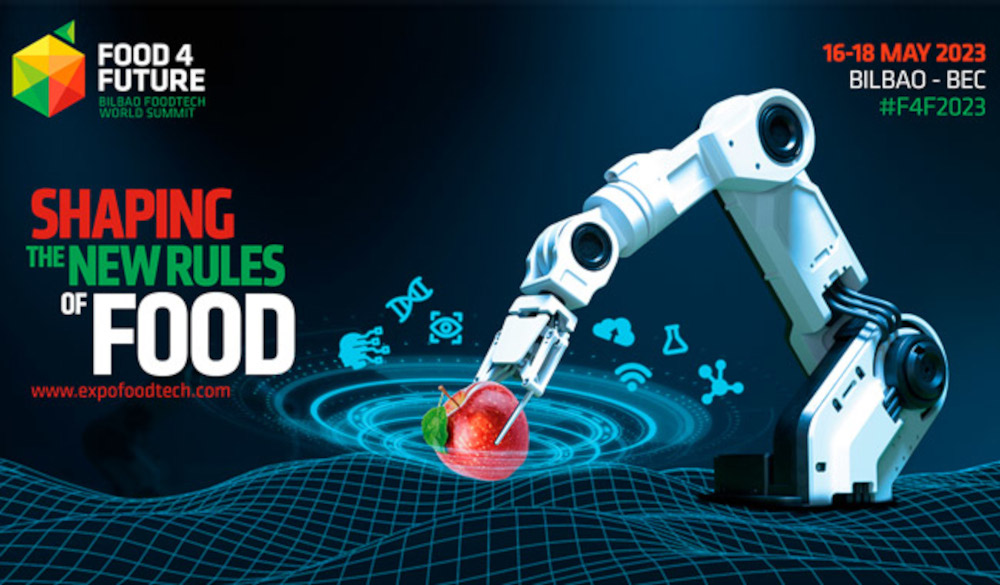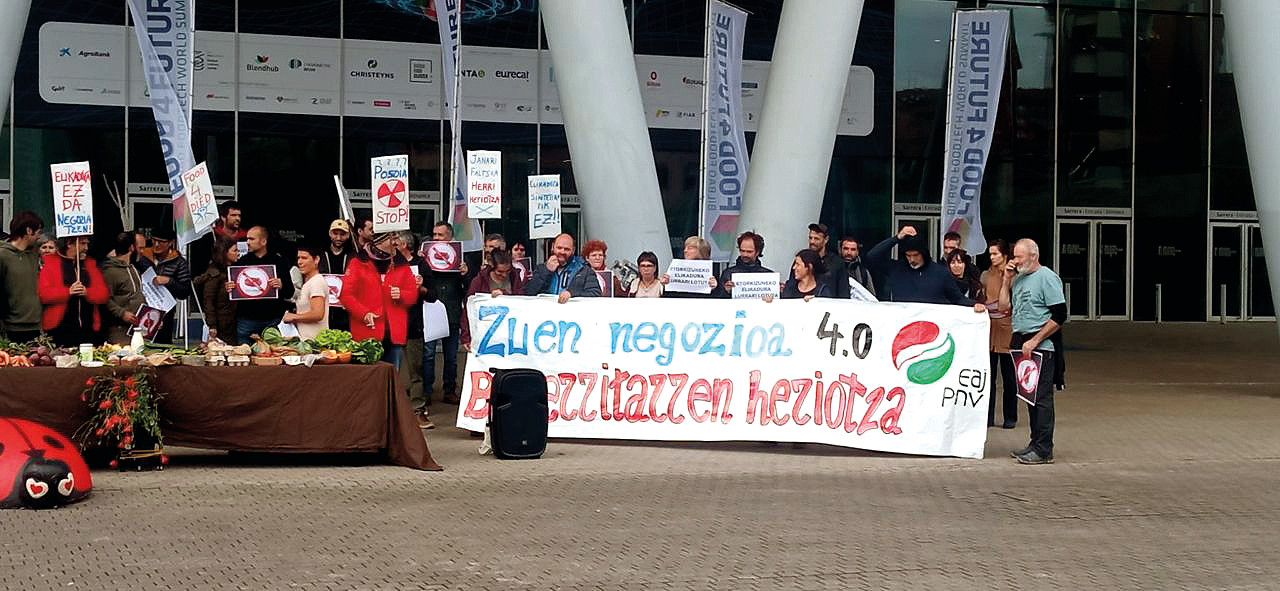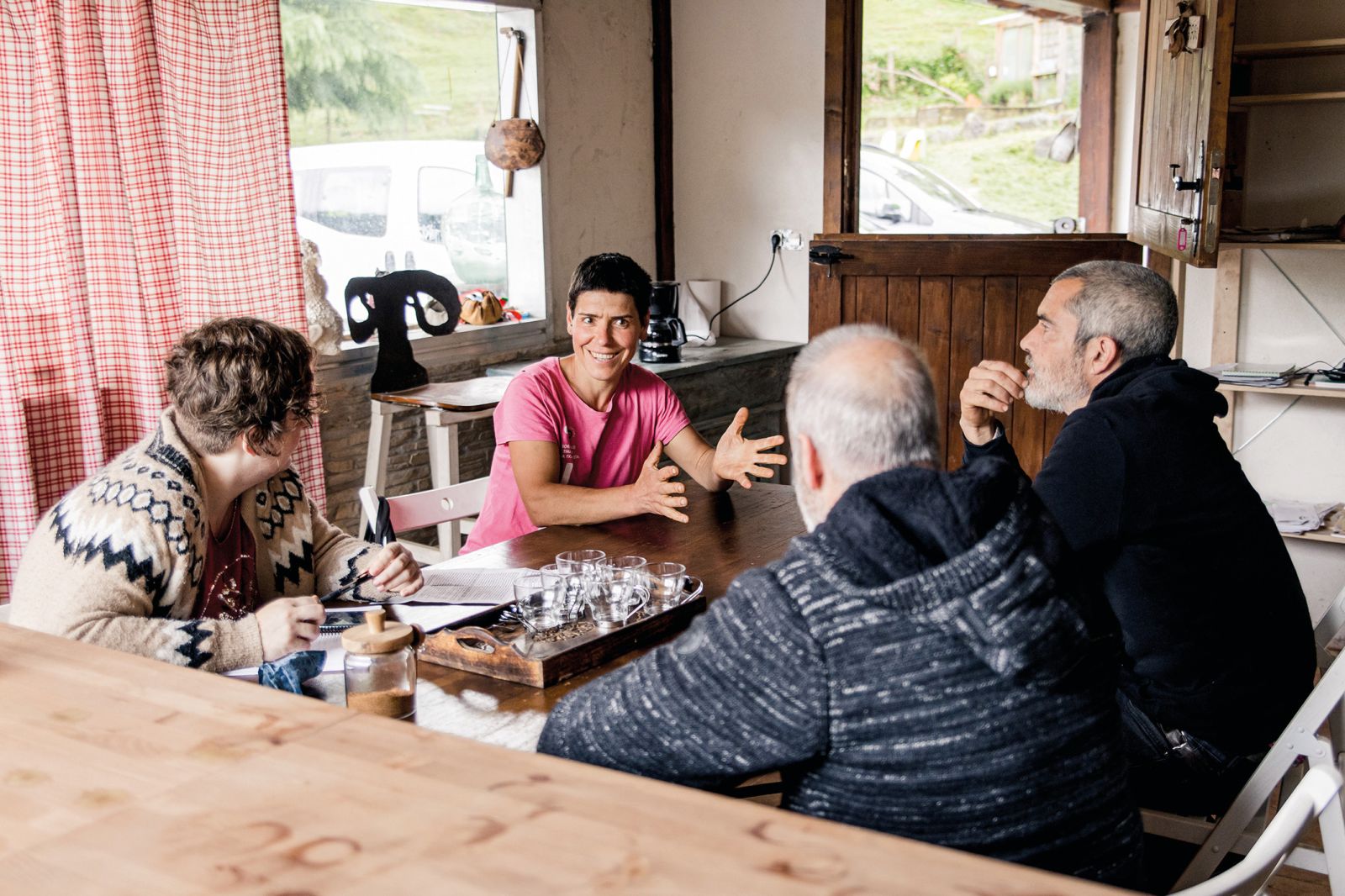“The food of the future will be linked or not to the earth”
- In May, the Food For Future Congress was held at BEC to show “technological innovations in the food industry”. In this “business platform”, organized by Azti in full in English, synthetic foods and 3D printers have been exposed. The day before a few small farmers called to concentrate in front of BEC. We turn to them asking about the food of the future.

When they got the statement, we first heard about the "Wood and Sailing" initiative. Who makes it and what has it been created for?
Kelo Arribas: Biolur is an organic farming association of which we are all part. As small baserritars and agroecological workers, we did not see our voice represented, especially in Gipuzkoa. We needed an organization to organize and channel our responses.
We are bringing together eight people every fifteen days. We have raised the need for union, but we see that it must be achieved step by step. We have started to reflect and to put forward some actions, being the Ortzimugan trade union.
Exker: We have started working together on our vision of things. We want to give an answer to Food For Future: our actions talk about us and talk through them.
Nerea Arrizabalaga: We are small baserritars that we live at another pace, more attached to the rhythm of nature. We have a simpler view of the world, we know our production because it is tailored to the people who work in it, we are close to the people who consume our products...
Exker: We all sell live, we do not sell in supermarkets or large intermediaries, we are working on another model of farmhouse...
N. Arrizabalaga: But in the system in which we are located, other things are driven: macro-production, macro-projects, forums like Food For Future -- all of that we want to socialize.
C. Arribas: Many times other agents speak in the name of baserritars, for example, food sovereignty. And that's fine, they do it with the best will and many times better than us. But as workers, we must create a partnership between the baserritars and an organization to socialize our voice.

Why did they decide to face Food for Future?
N. Arrizabalaga: The name says the same, the food of the future is that. And where are we? We are the current food and the food of the future. Our model is the one that should open up, so we would not lack food, even if there is war or tariffs in Ukraine. They sell the opposite: that the food of the future will be artificial, that what we don't know where it comes from very well, that it will need a lot of inputs, that it consumes a lot of energy...
Exker: The authorities and the interests of these multinationals will not meet the needs of the citizens or facilitate the lives of the baserritars. In view of this, our desire is to say that there is another way of doing.
"Agroecology is the only way to address this new landscape: climate change, energy depletion, system of wars..."
C. Arribas: The Basque Government is a very short road. In the ecological and social crisis in which we are, we all know that we need a change of model. The food of the future will be linked or not to the earth. The only path is agroecology, and we do not say that, as the Food and Agriculture Organization of the United Nations says. This is the only way to feed people.
N. Arrizabalaga: Without completely destroying the environment.
Exker: Keep the soil in operation. Or we inside the Earth.
C. Arribas: The only way to address this new landscape: climate change, energy depletion, system of wars...
It is surprising that in Food For Futu there is no baserritarra.
N. Arrizabalaga: No animals, no baserritars... How is it possible to convene such a forum without food producers? !

C. Arribas: Bittor Oroz, Deputy Minister of Agriculture, Fisheries and Food Policy of the Basque Government, stated that in Euskal Herria there is no capacity to feed the citizens. You agree on that, but bet on the land of power, not 3D printers. That's why we're the baserritars, and the ones that we generate food, we can be more if he also facilitates the way and helps people. It is up to him to be able to produce enough.
N. Arrizabalaga: With the land we have in the Basque Country, Oroz should be ashamed to say that we are not able to feed ourselves. Of course, only 3-4% of what we consume today is what is produced here. Well, it enhances production here! Today, administration pressure is the greatest weight for us. Those of us who have acquired land and those of us who are in operation choke us in tickets, be they demands, be they controls... that puts us a great deal of weight, in addition to our work, and think for someone who has just entered! Land is becoming more and more artificialized, getting land is almost impossible...
Exker: And don't leave it to these big marketers. The baserritart is squeezed by its basic needs, which are cereals or feedingstuffs, which is electricity, which is gas oil..., which have a fixed price, which the baserritars cannot decide, and the one that produces, such as milk or meat, is put by others. So there are no producers, normal, who starts producing? There is no relay.
N. Arrizabalaga: These large farms, which they have promoted in recent years, can also make an important contribution to the reduction, can do a great deal of support and do nothing.
What about synthetic meat produced in 3D printers?
C. Arribas: They act with the protein crisis speech to say that a 3D machine will fix it. What, going back to a multinational?
Exker: Basque society is full of proteins.
N. Arrizabalaga: But people get in their heads with this repeated idea. Her Bajuan works on this 3D food issue until it normalice and people try it and it's thought it's the future.
Exker: Food is a rethinking issue. We consume too much protein. Our predecessors ate meat once a week and fish once a month. There are people who feed on less than a euro: to buy those sausages below a euro, when they have come to the supermarket wrapped in that plastic -- perhaps better not to eat and eat chickpeas or lentils.
N. Arrizabalaga: In our minds, the status comes from eating meat every day, and if we can't buy a good quality meat, we decrease the quality instead of buying once or twice a week and eating vegetables other days.
"3D will be food for the poor"
C. Arribas: 3D will be food for the poor. Because whoever has money always prefers real chuleta.
N. Arrizabalaga: But 3D meat didn't show up like this: first they said it's very expensive to produce and it seemed it was going to be for the elites. But they've already prepared to produce two tons on Iraq's day, and it's going to be more humble people.
Exker: There's another stream that sees synthetic meat interesting, that of vegans.
N. Arrizabalaga: It can be contradictory, vegans don't take honey either because it's produced by bees, and to make synthetic meat stem cells don't know if they can be considered alive. Where do they come from or how do these cells feed?

Renewable energy macro-projects have gone into the field...
Exker: Those who have shattered every corner are already selling their solution. This is a solution for them, a system to keep making money, occupying land. If we now bring land to these multinationals, we are without land to feed ourselves.
N. Arrizabalaga: It's all business.
"I understand that renewables are going to be needed, but first stop the APR"
Exker: I understand that renewable energies are going to be needed, but first stop at the APR: stop spending money and energy on that. They say that only with artificial areas will we not get enough energy, but solar panels have still been placed in a very small percentage of these lands and we are already looking for fields and grasslands. There is a place where it has been done in the villages, in the industrial polygons, and if then more is needed, we will talk.
C. Arribas: This is another business, not a solution. With renewables they produce electricity and electricity is a small part of energy consumption. The main consumption is gas oil and we do not want to look at it. Why? Because that requires a change of model and we don't want it. This is a patch that is useless, especially to do business to the multinationals and to give discourse to politicians, to say “we are solving”. And it's not credible, the data is very clear. So it's a very short vision, but we all eat that speech. The worst thing is that now our lands are at stake.
"They want to create dependence on us. If we don't have land to produce food, they'll decide what to feed."
N. Arrizabalaga: I think they want to create dependence. If we don't have land to produce food, they'll decide what it's going to eat, because they won't leave us any other alternative. If you get the 3D food when you don't have anything else -- it looks like they want to bring us a bite.
Exker: It gives you strength and confidence in yourself. The multinationals and the possible ones such as Food for Future are not interested in this because they do not negotiate: agroecology is the only solution, but if each people manages its land and its own food, there is no business, there is not much volume, the good remains among us.
N. Arrizabalaga: We become like those countries that we call the "third world," a company in Norway is going to exploit the wind turbines here and it's going to take the money, like the solar panels, and we're not going to be able to produce our food ... I am reminded of the African lands, which the rich countries export...
Exker: It's colonialism. They come to agricultural land, they have money or what's worse: they don't have money, they're doing things with the money that can then be there. They are mortgaging, not them, but the next generation, as they have done with the incinerator. Who will be responsible for a growing burden? They have no responsibility.
C. Arribas: There is also the colonialism of the city in rural areas: In the Basque Country, 90% of the population lives in 10% of the territory. The city cannot destroy any more camps, just colonize the camp! Put the wind turbines on the Shell! There's consumption, let's leave the mountain alone, those of us who live in it are in another model, we don't need that much energy. Society must be critical and assume its consumption.
Is the relationship between the street and the mountain weakened?
Exker: I don't take the street dichotomy and peasant right. There are ways to be on the street and to be in the cottage. In all there are people who are doing things consciously and well and in all there is what they are doing in form and pure egoism. There's also a lot of that in the rural world.
People are missing in villages and in rural areas. In the area where we live, there are a dozen villages back and we only live in two houses. In our case, we have to start looking for relief and it would surely be much more attractive to our children or to someone coming from outside, to share joys, fatigue and life if they were around them. The owners of these empty farmhouses are people like us and their intention is to sell them as expensive as possible.
N. Arrizabalaga: As consumers, if we look at where to buy or search for their food, people in general are far from home. Older people are either born in the farmhouse or are nearby, but young people and children are not: schools visit us and are surprised because potatoes are buried, or they see the sheath and do not identify it with peas. This gives an idea and a responsibility.
C. Arribas: I too see it a long way away. Over time, a few steps have been taken, there is more awareness, but we lack much. These crises give some the impression that our food is dependent on Ukraine. For a while I noticed people worried about food and eager to learn seeds, but it's already happened. When the Ukrainian war broke out, some had the concern of nuclear war and had the reflection of making our seeds, keeping them and making orchard. They are very few, but perhaps more and more, because the crisis reaches more people. They're looking for a model change.
The change of model inevitably comes, but the dream of vacation is "a last lap"...
"The key is to change the direction of the gaze. The needs of the person are very simple and nowadays they have the least value"
Exker: The key is to change the direction of the gaze. The needs of the person are very simple and they have the least value at present. We'd have to go to those basics, and I think the cottage has its place, its way of doing. As a society, we know how to do some things in the right direction. That is where we should put the force.
C. Arribas: We have to prepare for change. How? Taking care of each other, working on food sovereignty and learning from self-sufficiency, so as not to be dependent on multinationals, weapons or governments.
N. Arrizabalaga: People don't want to leave their pace of life, we're not preparing. And interestingly, it is precisely those of us who have a tool to move forward from the point of view of sovereignty that are the ones who care most about change, the ones who see it. The later it starts, the more abrupt the change will be.
The price rise does, but the food crisis does not speak on the street.
Exker: To give an example, we are trying to bring the whole grain we give to the sheep close and it seems that there will be hardly any grain in the area and that what is there will be very expensive. It is a consequence of drought. We are sure to be affected.
C. Arribas: The 2008 crisis caused a very severe food crisis in Africa, and many people said that we had to be vigilant because we too are dependent. It is therefore not a new issue but we do not want to see it. And of course we're in danger. We think for us there will always be food, because we have money and we think we have that privilege. And I don't think it's for everyone. We are impoverishing and I am concerned: In Navarra the harvest has been lost, but also in Castile, Andalusia and Catalonia. In Argentina there have also been droughts and soybeans are produced there, which are then used to feed pigs from the Catalan macro-farms. Earlier the food crises were seen in Tunisia, but it is getting closer.
Biotech Foods, a synthetic meat company that will broadcast in San Sebastian and whose main partner is Brazilian corruption
Biotech Foods will open in San Sebastian, in 2024, one of the first laboratory meat factories in Europe. The Poligono Eskusaitzeta will have a plant of 11,000 square meters. The company has explained that the biopsy of animals allows the capture of muscle cells fed in stainless steel tanks for growth. This synthetic meat will then be sold to food processors.
EHNE has announced in Etxalde magazine that the main shareholder of Biotech Foods is Brazil’s JBS company: It has invested EUR 36 million in 2021, covering the capital increase. Former managers and members of the JBS Board of Directors acknowledge that they bribed 1,800 politicians from 28 Brazilian parties, who used $180 million over the past 15 years. JBS is the world's largest meat producer.
Kelo Arribas: "No one is falling apart because the baserritars have been left out and have been given room in BEC, at the Food For Future Congress."
In the face of this corruption case, the Norwegian Pension Fund ceases to be a shareholder of JBS.
Behetik gorako komunikazioetan ez da erraza mezuen garrantzia transmititzea eta makinaria politikoa aktibatzea. Askotan, gure mezuak "belarri batetik sartu eta bestetik atera" egiten direla sentitzen dugu. Beraz, gaurkoan, nazioarteko ikertzaile ospetsu batzuek... [+]
Laborantza lur emankorrak ondasun kolektibo bilakatu nahi ditu Amillubi proiektuak. Horretarako herritarren eta hainbat kolektibo eta erakunderen ekarpenak biltzen ari da eta maiatzaren 11rako egun osoko festa antolatu du Amillubin bertan, egitasmoari bultzada emateko.
Berangoko Otxantegiko nekazal lurrak modu kolektiboan lantzen bi urte eman ditu proiektu agroekologikoak, baina desalojo agindua dute apirilaren 18rako. Kanporatzea gelditzea lortu zuten iaz, eta berriro ere lortuko dutelakoan, gosari herrikoia deitu dute egun horretarako... [+]
Ardogintza borborka dago: mundu mailan gaineskaintza dagoela-eta, iaz milaka litro erosi zituen Jaurlaritzak destilatzeko. Espainiako Gobernuak diruz lagundu zuen mahats berdea lurrera botatzea. Aurten ere antzeko neurriak hasi dira agertzen. Baina nola iritsi gara egoera... [+]











